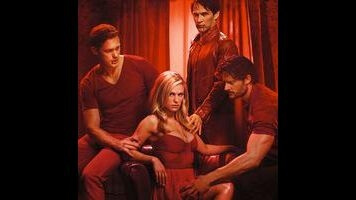True Blood: "Strange Love"

Hello, and welcome to the True Blood blog. I should start by establishing a baseline here: I’m dubious of Alan Ball. To me, his Oscar-winning screenplay for American Beauty is the weakest element of that movie, a cheap assortment of something-rotten-in-suburbia clichés and thudding ironies, like the abusive, militaristic father who turns out to be a repressed homosexual. Ditto his new movie Towelhead, which piles on the social/cultural/sexual provocations to few fruitful ends. And yet there’s still Six Feet Under, which proved that Ball has a facility for compelling television, because he does have a talent for tart dialogue and ensemble writing, and he doesn’t have to stuff eight pounds of thematic shit into a three-pound bag.
And so now we come to True Blood, Ball’s new HBO series, based on a series of books called Southern Vampire Tales by Charlaine Harris. I dutifully intend to follow this series through its first season, but based on tonight’s episode, “Strange Love,” we’re getting slightly more bad Ball than good Ball. I’ll go into more detail about it below, but the main problem is that it’s overcooked: The backwoods Southern gothic atmosphere, the accents, the vampire as wide-ranging social metaphor, the bitchy laughlines, and the über-kinky sex. (Okay, that last element really isn’t much of an issue for me.) Yet at the same time, there’s enormous potential in the premise, with its uneasy interaction between humans and the vampires who no longer need to feast on them for sustenance.
For me, the trouble begins with the opening credits sequence, a compendium of Deep South stereotypes that the show apparently doesn’t wish to transcend. Let’s see: There’s the KKK, a baptism in the river, possum roadkill (“Look maw, dinner!”), road house strippers, a rattlesnake, and the requisite Bayou swampland. There’s also a sign that reads, “God Hates Fangs,” which immediately connects vampires with gay culture, though the metaphor will prove to be a little more fluid than that. To put it broadly, vampires are a metaphor for outsiders of any kind, gay being just the most prominent.
The prologue packs a lot of exposition into a tight little package, as a horny (mortal) couple pulls off a convenience store to ask about “Tru Blood,” a Japanese synthetic that gives vamps a food source that doesn’t course through arteries in the neck (or, um, the groin.) On TV is a representative of the American Vampire League, appearing on Bill Maher’s show to make a case for vampire rights—not an easy task considering the centuries they’ve spent feeding off people. Against this backdrop, we get a classic Six Feet Under-style prologue fakeout where the menacing clerk who seems to be a vampire actually isn’t and an overall-sporting redneck is. We also get a first look at the descending fangs, which snap into place like a switchblade.
From there, we enter the Bayou burg of Bon Temps, Louisiana, a backwater town that’s never seen much in the way of vampires. (Though sexual adventurers can travel to a “vampire bar” in Shreveport, but we’ll get to that later.) Our hero is Sookie Stackhouse (Anna Paquin), a chirpy waitress at Merlotte’s Bar and Grill who has a special talent: She can hear everybody’s thoughts. Joining her at Merlotte’s is a battery of supporting players, including her protective boss Sam (Sam Trammell); her sassy best friend Tara (Rutina Wesley); and Lafayette (Nelsan Ellis), a swishy short-order cook who tosses out one-liners at a rate approximating Kim “innuendo-bot” Cattrall on Sex And The City.
Amid the profane sex talk that fills the air at Merlotte’s—and the even nastier thoughts inside its customers’ heads—Sookie is something of a prude, projecting the girlishness of the sexually inexperienced. Even so, her pulse quickens when Bill (Stephen Moyer), a 173-year-old vampire, enters the bar with an expression that suggests he could outdo David Boreanaz in a brood-off. She’s completely delighted to meet this exotic creature, but his reaction is intriguingly ambivalent; he’s clearly charmed by her to a degree, but he’s suspicious and dangerous and perhaps wary of attracting unwanted attention. Their tenuous chemistry is one of the things that gives me hope about this series: Somewhere between Sookie’s naïve enthusiasm and Bill’s surly world-weariness there’s genuine chemistry of the kind that have had people swooning over vampire lore since Bram Stoker first put pen to paper.
 Keep scrolling for more great stories.
Keep scrolling for more great stories.
